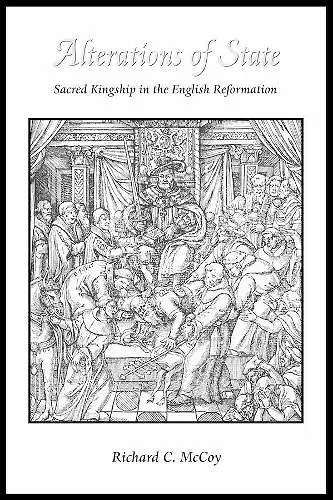Alterations of State
Sacred Kingship in the English Reformation
Format:Hardback
Publisher:Columbia University Press
Published:19th Aug '02
Currently unavailable, and unfortunately no date known when it will be back

During the English reformation, writers like John Skelton, Shakespeare, John Milton, and Andrew Marvell grappled with the idea of kingship and royalty, its real presence and figurative power. McCoy explains why religious devotion to the royal person became both more acute and more problematic during England's turbulent seventeenth century.
Traditional notions of sacred kingship became both more grandiose and more problematic during England's turbulent sixteenth and seventeenth centuries. The reformation launched by Henry VIII and his claims for royal supremacy and divine right rule led to the suppression of the Mass, as the host and crucifix were overshadowed by royal iconography and pageantry. These changes began a religious controversy in England that would lead to civil war, regicide, restoration, and ultimately revolution. Richard McCoy shows that, amid these sometimes cataclysmic Alterations of State, writers like John Skelton, Shakespeare, John Milton, and Andrew Marvell grappled with the idea of kingship and its symbolic and substantive power. Their artistic representations of the crown reveal the passion and ambivalence with which the English viewed their royal leaders. While these writers differed on the fundamental questions of the day-Skelton was a staunch defender of the English monarchy and traditional religion, Milton was a radical opponent of both, and Shakespeare and Marvell were more equivocal-they shared an abiding fascination with the royal presence or, sometimes more tellingly, the royal absence. Ranging from regicides real and imagined-with the very real specter of the slain King Charles I haunting the country like a revenant of the king's ghost in Shakespeare's Hamlet-from the royal sepulcher at Westminster Abbey to Peter Paul Reubens's Apotheosis of King James at Whitehall, and from the Elizabethan compromise to the Glorious Revolution, McCoy plumbs the depths of English attitudes toward the king, the state, and the very idea of holiness. He reveals how older notions of sacred kingship expanded during the political and religious crises that transformed the English nation, and helps us understand why the conflicting emotions engendered by this expansion have proven so persistent.
Offers an insightful synthesis of both historical and literary views on the subject of sacred kingship in English thought across nearly four centuries in one rather brief book. Journal of Church & State A welcome addition to any scholar of the seventeenth century... well-written and informative. 17th Century News McCoy proposes a characteristically modern compensation for the loss of both real and royal presence...Alterations of State synthesizes two important approaches to the decline of 'traditional' religion and the eventual desacralizing of sovereignty... [and] manages to distill a tremendously broad range of materials into a concise history of sacred kingship. -- Jennifer Waldron Journal of Religion and Society Alterations of State is well-written and researched... McCoy weaves the history and literature into a whole, thus making this text a valuable tool for the scholar of early modern studies. The work is also highly accessible, as he thoroughly explains concepts and characters, making it a good choice for upper-level and graduate students. -- Laura Musselwhite Renaissance Quarterly Add Richard McCoy's Alterations of State: Sacred Kingship in the English Reformation to the list of compelling books that show how early modern kingship was symbolically important not just at court. -- Glen Bowman Sixteenth Century Journal
ISBN: 9780231126168
Dimensions: unknown
Weight: unknown
192 pages